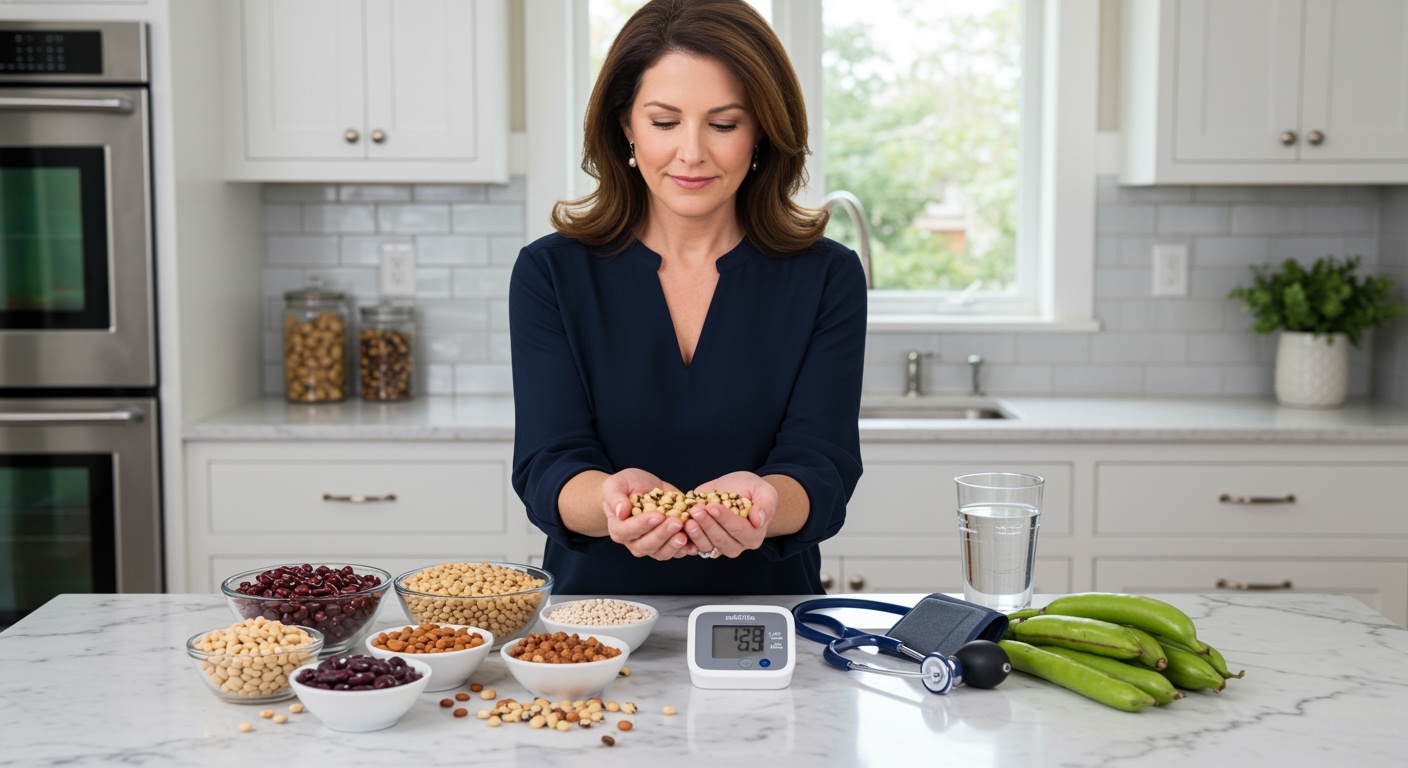✪ Key Takeaway: Hypotension patients should eat cowpeas in moderation as they may further lower already low blood pressure levels.
Introduction
Your doctor just told you that your blood pressure is too low and you need to make dietary changes.
You might be wondering whether cowpeas, those protein-rich legumes sitting in your pantry, will help or hurt your hypotension condition.
Hi, I’m Abdur, your nutrition coach and today I’m going to explain exactly how cowpeas affect blood pressure and whether hypotension patients should include them in their diet.
What Exactly Are Cowpeas And Their Nutritional Profile?
Cowpeas, also known as black-eyed peas, are legumes that belong to the same family as kidney beans and lentils.
These cream-colored beans with distinctive black spots contain impressive amounts of protein, fiber, and essential minerals.
One cup of cooked cowpeas provides about 13 grams of protein, 11 grams of fiber, and significant amounts of potassium, magnesium, and folate.
The potassium content in cowpeas is particularly noteworthy, with one cup containing approximately 690 milligrams of this essential mineral.
Potassium plays a crucial role in regulating blood pressure by helping blood vessels relax and reducing sodium retention in the body.
✪ Fact: Cowpeas contain more potassium per serving than bananas, which are famous for their potassium content.
How Do Cowpeas Affect Blood Pressure Levels?
Research shows that cowpeas have blood pressure lowering effects due to their high potassium and magnesium content.
When you consume potassium-rich foods like cowpeas, your kidneys excrete more sodium through urine, which reduces blood volume and pressure.
The magnesium in cowpeas also contributes to blood pressure reduction by helping blood vessels relax and dilate.
Studies indicate that people who consume higher amounts of legumes, including cowpeas, tend to have lower systolic and diastolic blood pressure readings.
The fiber content in cowpeas may also play a role in blood pressure regulation by improving overall cardiovascular health and reducing inflammation.
For people with normal or high blood pressure, these effects are beneficial and protective against cardiovascular disease.
✪ Pro Tip: The blood pressure lowering effects of cowpeas typically occur within 2-4 hours after consumption.
Should Hypotension Patients Avoid Cowpeas Completely?
Hypotension patients do not need to avoid cowpeas completely, but they should consume them with careful consideration.
The key is understanding that cowpeas can potentially lower your blood pressure further, which might worsen symptoms like dizziness, fatigue, or fainting.
If your hypotension is mild and you do not experience significant symptoms, small portions of cowpeas may be acceptable.
However, if you have severe hypotension or frequently experience symptoms, you should limit your intake of high-potassium foods like cowpeas.
The timing of consumption also matters – eating cowpeas when your blood pressure is already at its lowest point of the day could be problematic.
Many people with hypotension find that their blood pressure drops most significantly after meals, a condition called postprandial hypotension.
✪ Note: Always monitor your blood pressure before and after eating cowpeas to understand your individual response.
What Are Better Food Choices For Hypotension Patients?
Hypotension patients benefit more from foods that help raise blood pressure naturally and safely.
Foods with moderate sodium content, such as olives, pickles, and naturally cured meats, can help increase blood volume and pressure.
Caffeine-containing foods and beverages like coffee, tea, and dark chocolate can provide temporary blood pressure elevation.
Foods rich in vitamin B12 and folate, such as eggs, dairy products, and leafy greens, support healthy blood cell production and circulation.
Staying adequately hydrated with water and consuming smaller, frequent meals can also help prevent blood pressure drops.
If you want to include legumes in your diet, consider options with lower potassium content, such as chickpeas or navy beans, in smaller portions.
✪ Pro Tip: Combine any legumes with salty foods to help counteract their blood pressure lowering effects.
The Bottom Line
Hypotension patients should approach cowpeas with caution due to their potent blood pressure lowering properties.
Smart nutrition means choosing foods that work with your body, not against it – and for hypotension patients, this often means limiting high-potassium foods like cowpeas.
I would love to hear about your experience with cowpeas and blood pressure management, so please share your thoughts or questions in the comments below.
References
At NutritionCrown, we use quality and credible sources to ensure our content is accurate and trustworthy. Below are the sources referenced in creating this article:
- PubMed: Cowpea nutritional and health benefits research
- PMC: Legumes and cardiovascular health effects
- Apollo 247: Benefits of cowpeas for health
- Narayana Health: Health benefits of cowpeas





